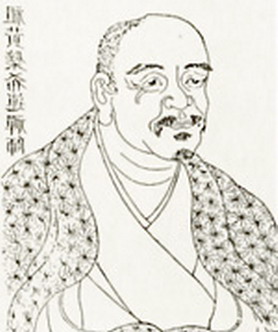Huang-po (Huangbo Xiyun) (?-849) was an influential Chinese Zen Master, and the teacher of Lin-chi (Rinzai) during the Tang Dynasty.
Huángbò was a disciple of Baizhang Huaihai (720-840)
 There is not much information about the life of Huang Po. However he taught in the tradition of Zen Buddhism. Huang Po taught that enlightenment could be achieved by a silent mind and putting an end to conceptual thinking. This is a similar teaching to other Zen Masters such as Bodidharma and Dogen.
There is not much information about the life of Huang Po. However he taught in the tradition of Zen Buddhism. Huang Po taught that enlightenment could be achieved by a silent mind and putting an end to conceptual thinking. This is a similar teaching to other Zen Masters such as Bodidharma and Dogen.
Huang Po was known for his unorthodox method of teaching, and would sometimes slap his students and question whether really anyone could be a teacher of Zen.
On one occasion, Linji Yixuan was directed by the head monk, Muzhou Daoming, to question Huángbò on the meaning of Buddhism after Linji had been practicing in Huángbò’s monastery for three years without an interview. Three times Linji went to Huángbò and three times the only answer he got was a slap.
This is a short extract by Huang Po on the nature of the mind and Buddha nature:
“All Buddhas and all ordinary beings are nothing but the one mind. This mind is beginningless and endless, unborn and indestructible. It has no color or shape, neither exists nor doesn’t exist, isn’t old or new, long or short, large or small, since it transcends all measures, limits, names, and comparisons. It is what you see in front of you.
Start to think about it and immediately you are mistaken. It is like the boundless void, which can’t be fathomed or measured. The one mind is the Buddha, and there is no distinction between Buddha and ordinary beings, except that ordinary beings are attached to forms and thus seek for Buddhahood outside themselves. By this very seeking they lose it, since they are using Buddha to seek for Buddha, using mind to seek for mind. Even if they continue for a million eons, they will never be able to find it. They don’t know that all they have to do is put a stop to conceptual thinking, and the Buddha will appear before them, because this mind is the Buddha and the Buddha is all living beings. It is not any less for being manifested in ordinary things, nor any greater for being manifested in Buddhas.”
From: Stephen Mitchell’s The Enlightened Mind – An Anthology of Sacred Prose, Harper Perennial, 1991.
Huang Po Links
